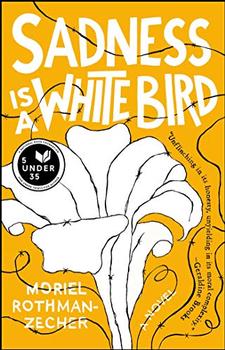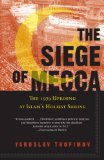Summary | Excerpt | Reviews | Beyond the book | Read-Alikes | Genres & Themes | Author Bio

Peace Not Apartheid
by Jimmy CarterFormer President Jimmy Carter clearly wrote Palestine: Peace
Not Apartheid with the intention of providing a counterbalance to the
usually one-sided pro-Israeli media coverage that Americans tend to hear about
the Israel-Palestine conflict. However, a number of expert commentators
feel that his presentation of events from the opposite side of the fence is just
as, if not more, distorted than the usually pro-Israeli media coverage in the
USA.
Unsurprisingly, Jewish groups are up in arms, with the Anti-Defamation League
taking out large advertisements in major newspapers last year, when the book was
first published in hardcover, accusing Carter of propagating "myths like Jewish
control of the government and media" and taking particular offense at the use of
the word 'apartheid'. Even Carter appears to contradict the use of
that so emotive word during the course of the book - early on he describes the barrier that
Israel is building along the West Bank as an "imprisonment wall"
and an indication of Israel's apartheid leanings; but later he states that the
driving force for the wall is not racism, but the acquisition of land (whereas,
the Israelis see it as a defensive measure to protect them from suicide
bombers). In between he rages that the security fence is a crime against
Christianity, ravaging "many places along its devious route that are important
to Christians."
Which brings up the question of the role that Carter's own faith plays in
forming his opinion. Early on he tells a story that causes some to
question the role that his own religious beliefs play in his political stance.
During his first visit to Israel in the early 1970s, when he was governor of
Georgia, he met with Prime Minister Golda Meir (one of the founders of the State
of Israel and its fourth prime minister between 1969 and 1974). Carter, a born-again Christian,
reports that he told her that he had "long taught lessons from the Hebrew
Scriptures and that a common historical pattern was that Israel was punished
whenever the leaders turned away from devout worship of God." He asked
Meir if "she was concerned about the secular nature of her Labor
government." Meir merely shrugs, perhaps the politest thing she could do in the circumstances; but Carter expresses himself pleased with his own temerity - so much so that, 30 years later, he includes this little contretemps in his history of the conflict.
Carter appears to view the politics of the Middle East through a very narrow
lens. Without doubt, if Israel and Palestine had been living in harmony
for a generation or two the Mullahs would have one less very large ax to grind,
but to imply that if Israel had "refrained from colonizing the West Bank" there
would be comprehensive peace across the Middle-East now seems too sweeping a
judgment (as can be seen by Yaroslav Trofimov's The Siege of Mecca, reviewed in the hardcover section of this ezine). Looking at more recent events, he ignores the fact that
many in Israel are ready to give up the bulk of their settlements in the West
Bank - in fact it was one of the election platforms which got current Prime
Minister Ehud Olmert elected.
The Israel-Palestine situation is enormously complex with many gray areas.
Carter's book was a bestseller last year in hardcover, and looks to be doing
well in paperback, because American readers genuinely want to
understand this conflict. The controversy has been extensively debated in
other countries from both points of view, but in the USA it has been shown
to be political suicide to express negative comment against
Israel (as was ably illustrated in CNN's recent special reports, "God's
Warriors" presented by Christiane Amanpour), and even the major newspapers
and magazines exercise similar constraint; so the opportunity to hear the other
point of view should be welcome.
There is much in the book that is of value, such as the chapter devoted to the humiliations of every day life for the Palestinians under Israeli occupation, the confiscation of farm produce, unfair competition from Israeli goods, the withholding of foreign donations, leveling of houses without legal recourse, and so on and so forth; and the fact does remain that Israel is in violation of key U.N. resolutions. However, whereas Carter goes out of his way to cite examples of Israeli bad faith frequently, he
allows many apparently hollow statements and arguable misrepresentations by Israel's enemies to pass into print with little in the way of counter-argument or even comment.
There will always be people ready to criticize any book written about the Israel-Palestine conflict, especially one from a pro-Palestinian viewpoint; but it seems a great pity that Carter, one of the highest-profile authorities on the area, has left himself open to such easy pot-shots with what, at times, comes across as an unnecessarily unbalanced account of the conflict.
Interesting Link: The
BBC's comprehensive resource of current and historic information about the
Israel-Palestine conflict.
![]() This review
first ran in the October 4, 2007
issue of BookBrowse Recommends.
This review
first ran in the October 4, 2007
issue of BookBrowse Recommends.

If you liked Palestine, try these:

by Moriel Rothman-Zecher
Published 2019
In this lyrical and searing debut novel written by a rising literary star and MacDowell Fellow, a young man is preparing to serve in the Israeli army while also trying to reconcile his close relationship to two Palestinian siblings with his deeply ingrained loyalties to family and country.

by Yaroslav Trofimov
Published 2008
The dramatic and immensely consequential story of the violent takeover of Islam's holiest shrine, the Grand Mosque in Mecca, by Muslim fundamentalists in 1979. With nearly 100,000 worshipers trapped inside the holy compound, Mecca’s bloody siege lasted two weeks, inflaming Muslim rage against the United States with repercussions we still feel...
Your guide toexceptional books
BookBrowse seeks out and recommends the best in contemporary fiction and nonfiction—books that not only engage and entertain but also deepen our understanding of ourselves and the world around us.